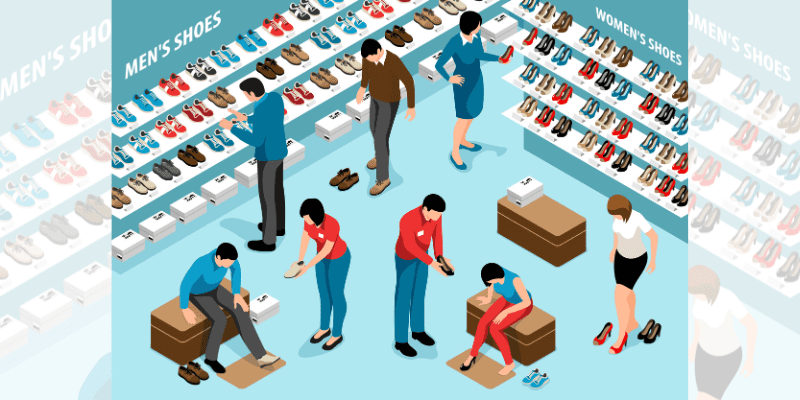Learn how to start a shoe boutique in 2025. Step-by-step guide covering costs, suppliers, branding, marketing, and profit margins to run a successful boutique. Fashion-conscious buyers are always looking for unique footwear, and boutique stores are the perfect way to meet this demand. Unlike large retail chains, a shoe boutique focuses on exclusivity, style, and personalized customer experience. In 2025, opening a boutique is easier than ever with a growing market for curated footwear.
This guide explains:
-
Why boutique shoe stores are profitable
-
Step-by-step process to open your own boutique
-
Costs involved and profit margins
-
Marketing strategies for attracting customers
-
FAQs about running a boutique
Why Start a Shoe Boutique?
There are several benefits of opening a boutique instead of a standard shoe shop:
-
High demand for exclusivity: Customers prefer stylish and limited-edition footwear.
-
Better profit margins: Boutique shoes often sell at higher markups.
-
Brand positioning: A boutique helps you build a premium image.
-
Growing fashion market: Rising income levels and urban lifestyles are fueling demand.
As a result, boutiques are becoming one of the most profitable business models in footwear retail.
Step-by-Step Process to Start a Shoe Boutique
Step 1 – Define Your Boutique Concept
Decide on the type of boutique you want:
-
Women’s footwear boutique
-
Men’s premium footwear boutique
-
Unisex casual and fashion shoes
-
Designer/handmade footwear boutique
Tip: Choose a niche that matches local demand and your passion.
Step 2 – Create a Business Plan
A boutique must stand out to succeed. Your plan should include:
-
Budget and investment breakdown
-
Target audience (youth, professionals, women, or luxury buyers)
-
Supplier details and stock planning
-
Marketing and branding strategy
-
Boutique location and design theme
Step 3 – Legal Registration & Licenses
For a professional boutique setup, you’ll need:
-
Business registration: Sole Proprietorship, Partnership, or Pvt Ltd.
-
GST registration: Required for billing customers and buying from wholesalers.
-
Shop and Establishment license: From the local municipal body.
-
Trademark: Protects your boutique’s name and logo.
Step 4 – Choose a Prime Location
Your boutique’s location determines footfall and success.
-
Select high-street markets, malls, or shopping complexes.
-
Ensure good visibility, parking facilities, and accessibility.
-
For premium boutiques, upscale neighborhoods work best.
Step 5 – Source Quality Suppliers
Boutiques rely on unique collections. Find suppliers who offer:
-
Imported or exclusive designs
-
Limited-edition collections
-
Handcrafted or designer footwear
-
Reliable delivery schedules
Suppliers can be found in hubs like Agra, Kanpur, Mumbai, or through B2B platforms like IndiaMART.
Step 6 – Design Your Boutique Store
Ambience plays a key role in boutique branding.
-
Attractive interiors with proper lighting
-
Stylish shoe racks and displays
-
Comfortable seating for customers
-
Branding elements like logo signage and packaging
Step 7 – Branding & Marketing
Marketing a boutique requires both offline and online promotion.
-
Social media: Showcase new arrivals on Instagram and Pinterest
-
Influencers: Collaborate with local fashion bloggers
-
Loyalty programs: Offer discounts to repeat buyers
-
Events: Host in-store launches or fashion shows
-
Google Business Profile: Increase visibility in local searches
Step 8 – Hire Staff and Train Them
Customer service defines boutique success. Train staff to:
-
Understand product features and style trends
-
Assist customers with personalized suggestions
-
Upsell accessories like bags or belts
Step 9 – Launch & Scale
At launch, offer discounts, exclusive collections, and influencer events. Once successful, you can:
-
Open multiple outlets in different cities
-
Sell boutique shoes online via Shopify or Instagram
-
Create your own footwear brand line
Costs of Starting a Shoe Boutique
| Expense Type | Estimated Cost |
|---|---|
| Shop Rent/Interiors | ₹2,00,000 – ₹10,00,000 |
| Inventory/Stock | ₹5,00,000 – ₹15,00,000 |
| Licenses & Registrations | ₹20,000 – ₹50,000 |
| Marketing & Branding | ₹50,000 – ₹2,00,000 |
| Staff Salaries | ₹30,000 – ₹1,00,000/mo |
👉 Minimum boutique setup: ₹8–15 lakh depending on location and scale.
Is a Shoe Boutique Profitable?
Yes, shoe boutiques are profitable due to high markups.
-
Profit margins: 35%–60% depending on exclusivity.
-
Example: Buy at ₹2,000 → Sell at ₹3,500 → Profit = ₹1,500.
-
Selling 500 pairs monthly can generate over ₹7–8 lakh in revenue.
Therefore, boutique stores offer both prestige and profitability.
Common Mistakes to Avoid
-
Stocking too many generic shoes instead of unique designs
-
Choosing a low-footfall location to save rent
-
Ignoring online marketing and relying only on walk-ins
-
Poor customer service and untrained staff
Avoiding these mistakes helps you create a lasting boutique brand.
FAQs About Starting a Shoe Boutique
1. How much does it cost to open a shoe boutique?
You need ₹8–15 lakh for a small boutique. Premium boutiques can cost ₹20 lakh or more.
2. What profit margin can I expect in a shoe boutique?
Margins range from 35%–60%, depending on product exclusivity and location.
3. Do I need GST to run a boutique?
Yes, GST registration is required for billing and purchasing stock.
4. Which location is best for a shoe boutique?
High-street markets, malls, or premium neighborhoods with good footfall.
5. Can I sell boutique shoes online too?
Yes, many boutiques sell via Instagram, Shopify, or Amazon to expand reach.
Conclusion
Starting a shoe boutique in 2025 is a rewarding business idea. With fashion trends evolving quickly, there is a strong demand for stylish and unique footwear.
To succeed:
-
Choose a niche and target audience
-
Register your business and pick the right location
-
Source exclusive designs from trusted suppliers
-
Invest in branding, interiors, and customer service
-
Use online and offline marketing to grow sales
👉 Next Steps:
-
Download the Free Shoe Business Checklist (PDF).
-
Explore our list of Top Shoe Manufacturers in India.
-
Read the Pillar Guide: How to Start a Shoe Business in 2025.
Your boutique could become the go-to destination for fashion-forward footwear lovers.



